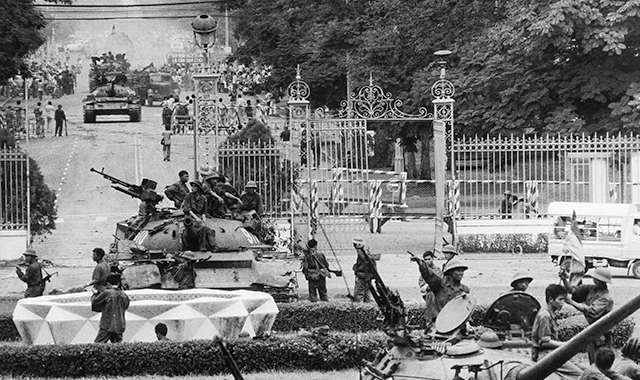
Back in 1975, I was in college trying to pass my classes and looking at some job offers in the local banks. As I recall, the economy was okay for college graduates but the word “recession” was mentioned in some circles. Watergate was behind us and the new President Gerald Ford was months away from facing a challenge from the former Governor Ronald Reagan of California.
During my time away from school work, I was dancing to Van McCoy’s “The hustle“, enjoying Elton John’s “Philadelphia Freedom” and laughing to tears watching “Monty Python and the Holy Grail“.
Over in Vietnam, the North Vietnamese and Viet Cong walked into Saigon and we’ve known it as “Ho Chi Minh City” ever since.
They walked in because the South Vietnam army, our ally, was totally overmatched by large and ruthless divisions pouring from the North.
As a South Vietnamese soldier told me a few years later, they killed everybody that they suspected of supporting the government in Saigon. They didn’t care whether it was man, woman, or child.
The tragedy of Vietnam is that the USSR could not believe that we let South Vietnam collapse in 1975, as Stephen J. Morris wrote on the 30th anniversary of the disintegration of Saigon:
If the United States had provided that level of support in 1975, when South Vietnam collapsed in the face of another North Vietnamese offensive, the outcome might have been at least the same as in 1972.But intense lobbying of Congress by the antiwar movement, especially in the context of the Watergate scandal, helped to drive cutbacks of American aid in 1974.Combined with the impact of the world oil crisis and inflation of 1973-74, the results were devastating for the south.As the triumphant North Vietnamese commander, Gen. Van Tien Dung, wrote later, President Nguyen Van Thieu of South Vietnam was forced to fight “a poor man’s war.”Even Hanoi’s main patron, the Soviet Union, was convinced that a North Vietnamese military victory was highly unlikely.Evidence from Soviet Communist Party archives suggests that, until 1974, Soviet military intelligence analysts and diplomats never believed that the North Vietnamese would be victorious on the battlefield. Only political and diplomatic efforts could succeed.Moscow thought that the South Vietnamese government was strong enough to defend itself with a continuation of American logistical support.The former Soviet chargé d’affaires in Hanoi during the 1970’s told me in Moscow in late 1993 that if one looked at the balance of forces, one could not predict that the South would be defeated.Until 1975, Moscow was not only impressed by American military power and political will, it also clearly had no desire to go to war with the United States over Vietnam.But after 1975, Soviet fear of the United States dissipated.
Again, it could have turned out very differently, especially for the many who served in Vietnam. They won the battles, and the politicians lost the peace.
So let remember today the generation drafted to fight a war that we chose to lose. And let’s not forget the millions slaughtered by the communists in Vietnam and later in Cambodia.
P.S. You can listen to my show. If you like our posts, please look for ”Donate” on the right column of the blog page.
Follow us: @AmericanThinker on Twitter | AmericanThinker on Facebook